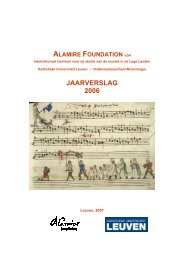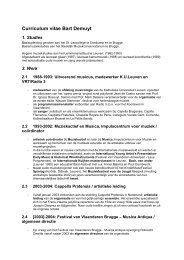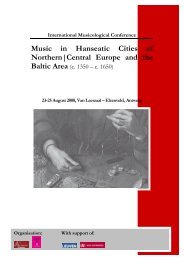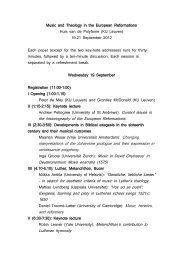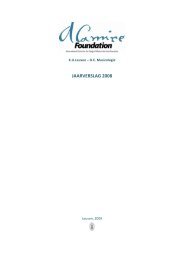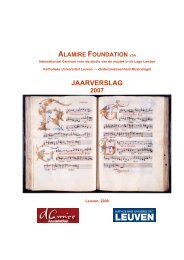YEARBOOK OF THE ALAMIRE FOUNDATION
YEARBOOK OF THE ALAMIRE FOUNDATION
YEARBOOK OF THE ALAMIRE FOUNDATION
You also want an ePaper? Increase the reach of your titles
YUMPU automatically turns print PDFs into web optimized ePapers that Google loves.
ORLANDO DI LASSO ET AL.: A NEW READING <strong>OF</strong> <strong>THE</strong> ROMAN VILLANELLA BOOK (1555)<br />
The predominant text-type in Dorico’s anthology is the lament, typically narrated by<br />
a lover martyred in pursuit of sexual satisfaction. Examples of this type are rare in<br />
books of canzoni villanesche published in the 1540s. But upon transplantation of the<br />
genre to Rome, a city dominated by single males in the service of the church, the<br />
number of laments increased dramatically, paving the way for the gentler Arcadian<br />
term villanella as an alternative to villanesca. In Dorico’s anthology a sub-type of<br />
lament emerges in a set of three villanelle characterized by witty parodies of Petrarchan<br />
tropes: no. 8 displays an excessive use of paradoxes as the lover dangles between life<br />
and death or freezing and burning (see Example 1); no. 9 opens with the first line of<br />
the commiato from Petrarch’s canzone 27a, the conceit of which is then subjected to<br />
caricature: 17<br />
(1) Io piango et ell’il volto suo mi volta,<br />
E del mio piant’ogn’hor si fa più lieta,<br />
Perchè preso mi trovo et ella sciolta.<br />
(2) Io piango et ella con piacer m’ascolta,<br />
Et ride sì che quasi m’acqueta,<br />
Perchè preso mi trovo et ella sciolta.<br />
(3) Io piango et ella ne fa festa molta,<br />
Et m’aggionge nel cor fiamma secreta,<br />
Perchè preso mi trovo et ella sciolta.<br />
(4) Io piango et ella spesso fa tal canto,<br />
Che mi fa dolce il mio tormento e pianto,<br />
Perchè preso mi trovo et ella sciolta.<br />
I weep and she turns her face away from me,<br />
and my tears make her happier every time,<br />
because I find myself caught and she released.<br />
I weep and she listens to me with pleasure,<br />
and laughs so that I’m almost appeased,<br />
because I find myself caught and she released.<br />
I weep and she makes much hilarity of it,<br />
increasing the secret burning in my heart,<br />
because I find myself caught and she released.<br />
I weep and she often makes such a song,<br />
which sweetens my torment and my tears,<br />
because I find myself caught and she<br />
released.<br />
17 A setting of Petrarch’s commiato attributed to Luigi Dentice was published in Il terzo libro delle muse<br />
a quattro voci madrigali ariosi da diversi eccell. musici, Barré, Rome, 1562.<br />
131



